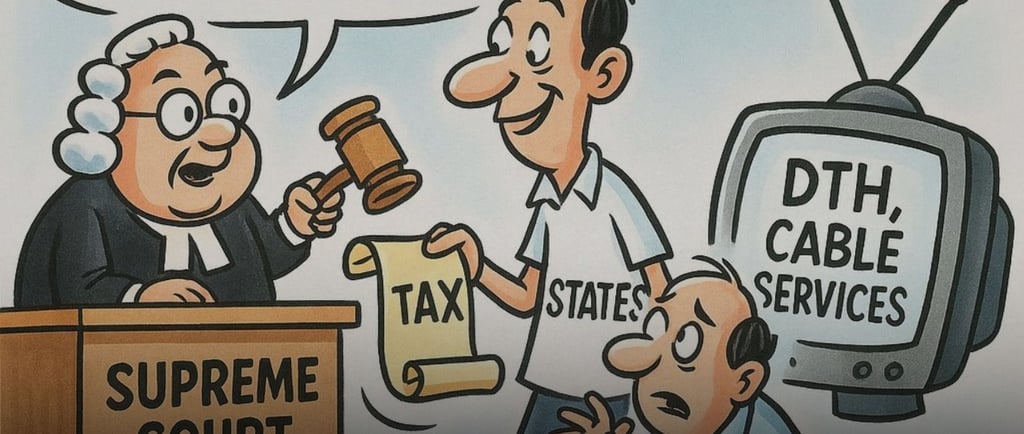Supreme Court allows states to levy entertainment tax on DTH and cable services despite Union’s service tax.
The Supreme Court upheld the constitutional validity of state-imposed entertainment tax on cable and DTH services, ruling that states can tax the entertainment aspect of these services, even if the Union levies service tax on broadcasting. The Court dismissed challenges from major DTH providers and reaffirmed that both state and central governments have the authority to tax different aspects of the same service. It clarified that entertainment through DTH is a taxable luxury, even at home, and states can impose taxes if their laws specifically include DTH services. The ruling also overturned a Kerala High Court judgment and provided guidance on the constitutional framework for taxation powers.
5/25/20252 min read


The Supreme Court of India has upheld the constitutional validity of entertainment tax levied by State governments on cable and Direct-to-Home (DTH) television services. In a significant judgment delivered by a bench comprising Justices BV Nagarathna and N Kotiswar Singh, the Court ruled that State governments have the authority to tax the “entertainment” aspect of such services, even though the broadcasting function is already subject to service tax by the Union government.
This decision came in response to appeals filed by major DTH service providers such as Tata Sky (now Tata Play), Dish TV, Sun Direct, and others. These companies had challenged various State laws that imposed entertainment tax on their services, arguing that since they were already subject to service tax under central law, the additional State tax amounted to double taxation. The Court, however, dismissed these arguments and upheld the power of States to levy entertainment tax under Entry 62 of the State List in the Constitution’s Seventh Schedule.
The Supreme Court based its ruling on the "aspect theory," which permits both the Union and State governments to tax different aspects of the same transaction. The Court clarified that while the Central government taxes the service component (broadcasting and transmission), States are entitled to tax the entertainment component delivered to the consumer. It emphasized that watching television via cable or DTH is a form of entertainment, and States are within their rights to impose a tax on this activity.
The judgment also overturned a 2012 Kerala High Court decision that had struck down a provision of the Kerala Tax on Luxuries Act, which imposed luxury tax on cable operators with more than 7,500 connections. The Supreme Court found this classification to be valid and not discriminatory, thus allowing Kerala’s appeal.
Furthermore, the Court addressed concerns about retrospective taxation. In the case of Uttar Pradesh, the Court ruled that States must specifically include DTH services within their taxing statutes to impose entertainment tax. Without such specific provisions, taxes cannot be applied retrospectively.
The ruling provides clarity on the division of taxation powers between the Centre and States. It underlines that Entry 31 of List I (related to broadcasting and communication) grants regulatory powers to the Union, but not taxation powers. On the other hand, Entry 62 of List II grants States the power to tax entertainment, including private home-based entertainment services like DTH and cable TV.
In conclusion, the Supreme Court’s decision reinforces the federal structure of taxation in India, allowing both the Centre and States to levy taxes on different facets of the same service. This landmark ruling not only validates entertainment tax laws in multiple States but also provides a framework for interpreting constitutional taxation powers in the digital age.
